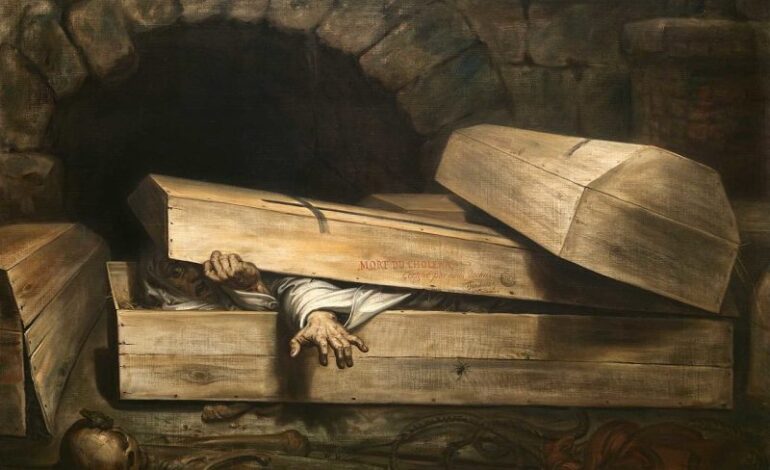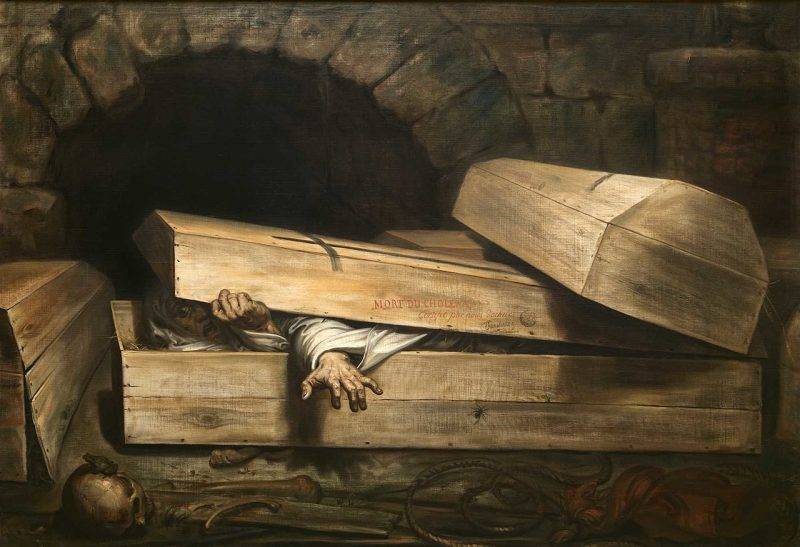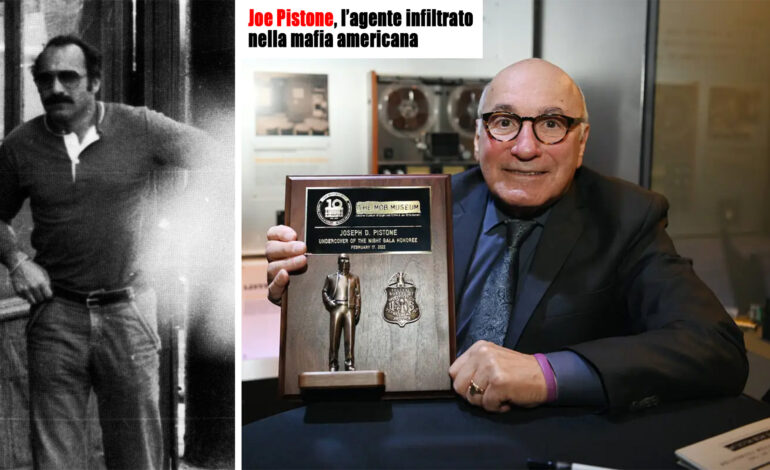Testimonianza su Alice Blunden, la donna vittima di due sepolture premature

Testo tratto dal libro “The town and manor of Basingstoke“, versione inglese
NEWS FROM THE GRAVE, &c.
At Basing-stoke, (a place sufficiently known by reason of the battle at Basing-House) in the County of Southampton, there lives one Mr. Blunden, a man of considerable repute in that Town, being one that drives a great trade in malt, &c. His wife was a woman whom I shall not attempt to characterize, because she was utterly a stranger to me, only thus far I may venture to describe her person, that she was a fat gross woman, and had accustomed herself many times to drink brandy. One evening above the rest, finding herself somewhat indisposed, she sent her maid to an apothecary’s in the Town for a quantity of poppy-water, whether by the direction of a physician or out of her own head (as we say) I know not : but she drank so great a quantity of it that she presently fell into a deep sleep, insomuch that all the people about her concluded her dead, there being not the least palpitation of the heart, motion of the pulses, breathings at her mouth or nose, nor any sensible warmth to be discerned in the whole body. The apothecary was immediately sent for, who by surveying the remainder of the poppy-water gave a guess at what she had taken, and concluded she would not recover her senses in eight and forty hours at least, and therefore he supposed never; From these words of the apothecary’s they concluded her stark dead, and that night laid her out, and though one of the persons employed about her observed that when she made any impression on her face the blood seemed to follow her finger, and by a kind of blush in her cheeks to be ashamed of their inhumanity ; yet such was either their haste or their stupidity, that they took little or no notice of it ; Her husband being then from home was sent to, and acquainted with the suddenness of the disaster, who was much surprised thereat, but having sudden and urgent business to London, and withal considering his grief at home would do his wife no more good than at a distance, he resolved on his journey, and the rather for the con- venience of buying mourning for himself and family, living orders nevertheless at his departure that the funeral should be deferred till his return, which he resolved on the Satur- day following, this being Tuesday, the 20th of July, 1674.*
- ” There is evidently an error as to the day of the month. Taking the narrative to be correct aa regards the day of the week, Mrs. Blundeu’s supposed death occurred on Tuesday, 14th July, as the Parish Eegister records,
‘Mr. William Blundon’ s wife huried July 15th, 1674.’ The 15th of July, in 1674, fell on a Wednesday, and to this extent the entry corroborates the narrative. He was no sooner gone but his wife’s relations to whom the management of things were committed, began to consider that it was a great while to Saturday, and that the season of the year being hot, and the corpse fat, it would be impossible to keep her, and therefore resolved to bury her the morrow, which accordingly they did, though many people admired they would commit a person to the earth before they were fully satisfied she was dead, especially in her husband’s absence, and contrary to his order. However, it being none of their business, they offered nothing against, so that on the morrow, all things being ready for the funeral (but the woman herself) away they carried her to Church, and the coffin being set down on two stools (as the manner of that Country is ) one of the bearers perceived both the coffin and the stools to stir, and was so unseasonably merry thereat as to whisper to his neighbour and tell him that they had made Mistress Blunden’s coffin so short that she could not be easy, for he plainly saw her stir. To which the other replied that if there were any motion it proceeded either from the weakness of the stools or the crowds of people that jogged them, and so there was no farther notice taken, but after the usual ceremonies of the Church she was committed to the earth : The Friday following toward the evening some of the Scholars of the Town being at play in the Churchyard near her grave, they fancied they heard a kind of hollow voice, as it were under ground, to which laying their ears and listening more attentively they plainly heard somebody say: Take me out of my Grave, which words the complaining voice repeated several times, intermixing them with fearful groans and dismal shriekings. The boys wonderfully terrified hereat ran away, and told several persons what they had heard ; but the relations were so unauthentic, and the story so improbable, that it was by all either slighted as childish, or reproved as fabulous, but stiU they affirmed it so stedfastly that on the next day, being Saturday, it came to the School Master’s ear, who immediately reproved some and chastised others for raising such reports.
Whereupon the boys being much, incensed at their unjust correction went again the Saturday noon to Mrs. Blunden’s grave, and not without some fear laying their ears to the ground, as formerly, they again heard the same words reiterated, if not with so distinct yet with a louder accent. Hereat emboldened with truth and childish rage, they went again and testified what they had formerly asserted. He somewhat startled hereat, began to consider of some passages and circumstances that were discoursed of in the Town, both at the time of her death and her funeral, and went presently to the place, and by the direction of one of the boys, laying his ear to the ground, he was presently confirmed in the truth of all they had asserted, though the voice then seemed very faint and languishing : Wherefore he would immediately have persuaded the Clerk to have digged up the grave, but he rephed he durst not do it without authority, so that before they could get Minister and Churchwardens together to consult about it, the after- noon was almost spent, but at last the grave being opened, and the coffin, which they had no sooner done, but the corpse puffed up as it had been a bladder, for the joiner had made the coffin so short that they were fain to press upon her and keep her down with a stick while they nailed her up.
And now surveying her body, they found it most lamentably beaten, which they concluded to proceed from the violence she did herself in that deplorable an astonishment (sic), but upon the most diligent scrutiny they could not apprehend that she had the least breath of life remaining, and therefore they again let her down into the grave, intending on the morrow to send to the Coroner, whom they thought necessary to acquaint with such an accident, in the mean time laying a charge on some persons diligently to watch her that night, they left her. But the night being unseasonably wet, and now all hopes of her second recovery being past, ‘tis believed those who were appointed to that office left her, for on the morrow morning at their return to the grave, they found she had torn ofE great part of her winding sheet, scratcliecl herself first in several places, and beaten her mouth so long till it was all in gore blood.
This second neglect moved the hearts of all that heard of it, especially those that were concerned in the first dis- covery, and the Coroner, when he came to sit upon her, found by all circumstances that her life was clearly thrown away, and therefore bound over several persons concerned therein to answer it at the next Assizes ; * where some were indicted as the authors of her death by their over hasty burying of her : and it would have gone very hard with them, but that a physician in the Town gave it upon oath that when the woman deceased, and was in her trance, he applyed a looking glass to her mouth a considerable time, and yet could not discern the least breath to come from her, a trial he had often experienced, and was never before deceived in, so that they all escaped with their lives, but only the Town had a considerable fine set upon them for their neglect. FINIS.

Versione italiana
NOTIZIE DALLA TOMBA, &c.
A Basing-stoke, (un luogo sufficientemente conosciuto a causa della battaglia di Basing-House) nella contea di Southampton, vive un certo Mr. Blunden, un uomo di notevole fama in quella città, essendo uno che guida un grande commercio di malto, &c. La sua moglie era una donna che non tenterò di caratterizzare, perché era assolutamente un sconosciuto a me, soltanto finora posso avventurarsi descrivere la sua persona, che era una donna lorda grassa ed aveva abituato molte volte bere il brandy. Una sera sopra il resto, trovandosi un po’ indisposta, mandò la sua cameriera in un farmacista in città per una quantità di acqua di papavero, sia per la direzione di un medico o fuori dalla sua testa (come si dice) Non lo so : ma ne bevve una quantità così grande che cadde subito in un sonno profondo, tanto che tutte le persone intorno a lei conclusero la sua morte, non essendoci la minima palpitazione del cuore, il movimento degli impulsi, respira alla bocca o al naso, né alcun calore sensibile da discernere in tutto il corpo. Il farmacista fu immediatamente mandato a chiamare, che rilevando il resto dell’acqua di papavero diede un’ipotesi su ciò che aveva preso, e concluse che non avrebbe recuperato i sensi almeno in otto e quaranta ore, e quindi non avrebbe mai supposto; Da queste parole dello speziale si concluse la sua morte, e quella notte la stese, e sebbene una delle persone impiegate intorno a lei osservasse che quando fece qualche impressione sul suo volto il sangue sembrava seguire il suo dito, e da una sorta di arrossire nelle sue guance di vergognarsi della loro disumanità ; tuttavia, o la loro fretta o la loro stupidità, che hanno preso poco o nessun avviso di esso ; Suo marito essendo poi da casa è stato inviato a, e familiarità con la repentinità del disastro, che è stato molto sorpreso, ma avendo affari improvvisi e urgenti a Londra, e withal considerando il suo dolore a casa avrebbe fatto la moglie non più buono che a distanza, ha risolto il suo viaggio, e piuttosto per il disagio di acquistare il lutto per se stesso e la famiglia, ordini viventi tuttavia alla sua partenza che il funerale dovrebbe essere differito fino al suo ritorno, che ha deciso il sabato successivo, questo essere Martedì 20 luglio 1674. *
- “C’è evidentemente un errore per quanto riguarda il giorno del mese. Prendendo la narrazione per essere corretto aa riguarda il giorno della settimana, Mrs. La presunta morte di Blundeu avvenne martedì 14 luglio Registri di Parish Eegister,
La moglie del sig. William Blundon’ huried il 15 luglio 1674. ‘il 15 luglio, in 1674, è caduto su un mercoledì ed a in questa misura l’ingresso corrobora la narrazione. Egli era non appena andato, ma i rapporti di sua moglie a cui la gestione delle cose sono state commesse, ha cominciato a considerare che era un grande tempo a Sabato, e che la stagione dell’anno essendo caldo, e il grasso cadavere, sarebbe impossibile tenerla, e quindi ha deciso di seppellirla il giorno dopo, che di conseguenza hanno fatto, anche se molte persone ammiravano che avrebbero commesso una persona alla terra prima di essere pienamente soddisfatti era morta, soprattutto in assenza di suo marito, e contrario al suo ordine. Tuttavia, non essendo nessuno dei loro affari, non offrirono nulla contro, in modo che domani, tutte le cose pronte per il funerale (ma la donna stessa) la portarono in Chiesa, e la bara fu deposta su due sgabelli (come la maniera di quel Paese è ) Uno dei portatori percepì la bara e gli sgabelli agitarsi, e fu così stranamente allegro da sussurrare al suo vicino e dirgli che avevano fatto la bara della signora Blunden così breve che non poteva essere facile, perché chiaramente vide il suo movimento. A cui l’altro rispose che se c’era qualche movimento procedeva o dalla debolezza delle feci o dalla folla di persone che le faceva jogging, e quindi non c’era più alcun preavviso preso, ma dopo le consuete cerimonie della Chiesa si è impegnata per la terra : Il venerdì seguente verso sera alcuni degli Eruditi della Città, essendo in gioco nel cimitero vicino alla sua tomba, essi immaginavano di sentire una sorta di voce cava, come se fosse sottoterra, a cui posare le orecchie e ascoltare più attentamente hanno sentito chiaramente qualcuno dire: Tirami fuori dalla mia tomba, che le parole la voce lamentosa ripetuto più volte, mescolandoli con gemiti timorosi e grida tristi. I ragazzi stupendamente terrorizzati fuggirono, e raccontarono a molte persone ciò che avevano sentito ; ma le relazioni erano così non autentiche, e la storia così improbabile, che era da tutti o trascurato come infantile, o rimproverato come favoloso, ma stiU affermarono che il giorno dopo, essendo sabato, venne all’orecchio del Maestro di scuola, che immediatamente rimproverò alcuni e rimproverò altri per aver sollevato tali relazioni.
Dopo di che i ragazzi essendo molto, infuriati per la loro ingiusta correzione andarono di nuovo il sabato a mezzogiorno alla tomba di Mrs. Blunden, e non senza che qualche paura mettesse le orecchie a terra, come in precedenza, udirono di nuovo le stesse parole ripetute, se non con così distinto ancora con un accento più forte. Qui incoraggiati dalla verità e dalla rabbia infantile, andarono di nuovo a testimoniare ciò che avevano precedentemente affermato. Egli qui si spaventò un po’, cominciò a considerare alcuni passaggi e circostanze di cui si parlava nella città, sia al momento della sua morte che al suo funerale, e andò subito al luogo, e dalla direzione di uno dei ragazzi, ponendo l’orecchio a terra, fu subito confermato nella verità di tutto ciò che avevano asserito, anche se la voce allora sembrava molto debole e languiva : Perciò avrebbe immediatamente persuaso il Cancelliere ad aver scavato la tomba, ma egli replicò che non poteva farlo senza autorità, in modo che prima che potessero ottenere Ministro e Churchwardens insieme per consultarsi su di esso, il dopomezzogiorno era quasi trascorso, ma alla fine la tomba viene aperta, e la bara, che non avevano fatto prima, ma il cadavere gonfiato come fosse stata una vescica, per il falegname aveva fatto la bara così breve che erano fain a premere su di lei e tenerla giù con un bastone mentre inchiodato lei.
Ed ora esaminando il suo corpo, lo hanno trovato tristemente battuto, che hanno concluso per procedere dalla violenza che lei stessa ha fatto in quel deplorable un astonishment (sic), ma sull’esame più diligente non potrebbero capire che ha avuto il minimo alito di vita restante, e quindi di nuovo la lasciarono scendere nella tomba, con l’intenzione il giorno dopo di inviare al medico legale, che hanno ritenuto necessario per conoscere un tale incidente, nel frattempo ponendo una carica su alcune persone diligentemente a guardarla quella notte, l’hanno lasciata. Ma la notte era insolitamente umida, e ora tutte le speranze della sua seconda guarigione erano passate, credevano che coloro che erano stati nominati in quell’ufficio l’avessero lasciata, perché la mattina di domani, al loro ritorno nella tomba, scoprirono che aveva strappato gran parte del suo lenzuolo, Si scaraventò per prima in diversi punti, e batté la bocca a lungo finché non fu tutto nel sangue di Dio.
Questa seconda negligenza ha commosso il cuore di tutti coloro che ne avevano sentito parlare, specialmente quelli che erano preoccupati nella prima scoperta, e il Coroner, quando è venuto a sedersi su di lei, ha scoperto da tutte le circostanze che la sua vita era chiaramente gettata via, e quindi vincolato su più persone in questione per rispondere alla prossima Assise ; * dove alcuni sono stati accusati come gli autori della sua morte da loro seppellire troppo frettoloso di lei : e sarebbe andato molto duro con loro, ma che un medico della Città ha giurato che quando la donna è deceduta, ed era in trance, ha applicato uno specchio alla sua bocca per un tempo considerevole, e ancora non riusciva a discernere il minimo respiro a venire da lei, una prova che aveva spesso sperimentato, e non era mai stato ingannato, in modo che tutti fuggirono con la loro vita, ma solo la città aveva una multa considerevole impostato su di loro per la loro negligenza. FINIS.









1 Comment
[…] Un breve e impreciso racconto venne pubblicato nel 1748, ma si ha un altra testimonianza in un trattato che risale al 1675, un anno dopo della sua morte (che potete trovare in questo nostro altro articolo). […]